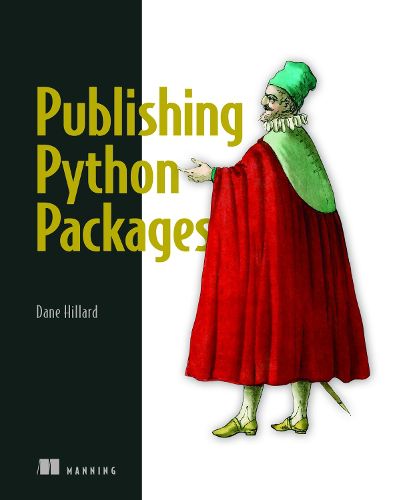Readings Newsletter
Become a Readings Member to make your shopping experience even easier.
Sign in or sign up for free!
You’re not far away from qualifying for FREE standard shipping within Australia
You’ve qualified for FREE standard shipping within Australia
The cart is loading…






Create Python packages to share your code in a scalable and maintainable way. Improve team productivity, publish helpful libraries, or even start your own open source project following the latest Python packaging standards.
In
Publishing Python Packages you will learn how to:
Build extensions and console script commands
Use tox to automate packaging, installing, and testing
Build a continuous integration pipeline using GitHub Actions
Improve code quality and reduce manual review using bandit, black, mypy, and radon
Create published documentation for your packages
Keep packages up to date with pyupgrade and Dependabot
Foster an open source community using GitHub features
Publishing Python Packages teaches you how to easily share your Python code with your team and the outside world. Learn a repeatable and highly automated process for package maintenance that’s based on the best practices, tools, and standards of Python packaging. Whether you’re entirely new to Python packaging or looking for optimal ways to maintain and scale your packages, this fast-paced and engaging guide is for you.
about the technology Python packages are a great way to share your code and give a productivity boost to your colleagues and community. Whether you’re reusing your code internally or contributing to open source, a properly automated system of packaging will save you from time-consuming manual maintenance.
about the book
Publishing Python Packages reveals best practices and standards for packaging your Python code in an easy, automated, and scalable way. The book walks you through creating a complete package, including a C extension, and guides you all the way to publishing on the Python Package Index. You’ll get hands-on experience with the latest packaging tools, and learn the ins-and-outs of package testing and continuous integration. You’ll even learn how to set up a successful open source project, including licensing, documentation, and nurturing a community of contributors.
$9.00 standard shipping within Australia
FREE standard shipping within Australia for orders over $100.00
Express & International shipping calculated at checkout
Create Python packages to share your code in a scalable and maintainable way. Improve team productivity, publish helpful libraries, or even start your own open source project following the latest Python packaging standards.
In
Publishing Python Packages you will learn how to:
Build extensions and console script commands
Use tox to automate packaging, installing, and testing
Build a continuous integration pipeline using GitHub Actions
Improve code quality and reduce manual review using bandit, black, mypy, and radon
Create published documentation for your packages
Keep packages up to date with pyupgrade and Dependabot
Foster an open source community using GitHub features
Publishing Python Packages teaches you how to easily share your Python code with your team and the outside world. Learn a repeatable and highly automated process for package maintenance that’s based on the best practices, tools, and standards of Python packaging. Whether you’re entirely new to Python packaging or looking for optimal ways to maintain and scale your packages, this fast-paced and engaging guide is for you.
about the technology Python packages are a great way to share your code and give a productivity boost to your colleagues and community. Whether you’re reusing your code internally or contributing to open source, a properly automated system of packaging will save you from time-consuming manual maintenance.
about the book
Publishing Python Packages reveals best practices and standards for packaging your Python code in an easy, automated, and scalable way. The book walks you through creating a complete package, including a C extension, and guides you all the way to publishing on the Python Package Index. You’ll get hands-on experience with the latest packaging tools, and learn the ins-and-outs of package testing and continuous integration. You’ll even learn how to set up a successful open source project, including licensing, documentation, and nurturing a community of contributors.